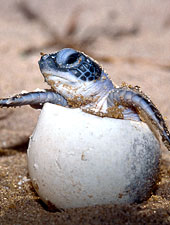
Only 7 marine turtles exist in the world today, 6 of which are found in Papua New Guinea’s waters. These include the Flatback, the Green Turtle, the Hawksbill, the Leatherback, the Loggerhead, and Olive Ridley. The country’s coastal waters are home to the world’s largest populations of Hawksbill, Green, and Leatherback turtles. Unfortunately, as humans encroach on and pollute their habitat, numbers of these marine turtles have been in severe decline.
The United States Fish and Wildlife Service currently lists the Leatherback, the largest species of marine turtle, as endangered. Because the turtles mature very slowly, some taking up to 50 years to reach sexual maturity, and travel long distances from beach to beach, any impacts in one region of the world can have devastating effects on the entire marine population.
With a body that can grow up to 8 feet long and weigh up to two tons, a docile demeanor, and the need to beach to lay eggs, the Leatherback can be easy prey for human consumption. One Global Greengrants Fund grantee, Mas Kagin Tapani Association, found human consumption of the Leatherback was contributing to its declining numbers, so they started a training program to promote sustainable consumption practices.

The trainings are the first of their kind in the area. They educate local indigenous populations on the turtle’s biology and threatened status, and then develop an action plan for conservation and sustainable management.
The target audience of the workshop included community members from the villages of Karkum, Mirap, Gildipasi, and surrounding areas. There were 62 participants at the first course.
The communities were so motivated by the trainings, they have created action plans to continue conservation efforts. Recently, they have begun tagging and monitoring nesting turtles in order to track their whereabouts and numbers. It’s a perfect example of community-led conservation in Papua New Guinea, all with just a little financial support from people like you.

